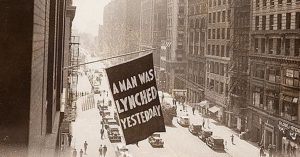Asim Ali in The Wire:
 The word ‘lynching’, which has recently flooded our newspapers, has an American origin. It entered into popular American usage in the second half of the 19th century. At least 3,500 lynchings occurred in America between 1865 and 1920, mostly in Southern America during the period of black disenfranchisement and the enactment of racist Jim Crow laws. These were not random and relatively spontaneous acts of violence, but purposeful and deeply political acts. The overarching context was the end of civil war and the need to enforce white supremacy and control AfricanAmericans in the absence of slavery.
The word ‘lynching’, which has recently flooded our newspapers, has an American origin. It entered into popular American usage in the second half of the 19th century. At least 3,500 lynchings occurred in America between 1865 and 1920, mostly in Southern America during the period of black disenfranchisement and the enactment of racist Jim Crow laws. These were not random and relatively spontaneous acts of violence, but purposeful and deeply political acts. The overarching context was the end of civil war and the need to enforce white supremacy and control AfricanAmericans in the absence of slavery.
While the justification given for these ritualised, public acts of violence was retribution for crimes committed by African Americans – usually involving (generally fabricated) accusations of sexual offences against white women – the deeper context was always the desire to deny political and social equality to the newly emancipated black population. As the then South Carolina Governor, Benjamin Tillman bluntly put it: “We of the South have never recognised the right of the negro to govern white men, and we never will. We have never believed him to be the equal of the white man, and we will not submit to his gratifying his lust on our wives and daughters without lynching him.”
There is a vast literature explaining and analysing lynchings in America, and it might be instructive to study it to better understand our current moment. Specifically, there are three broad lessons to be gained by turning to this horrific episode of American history.
More here.
